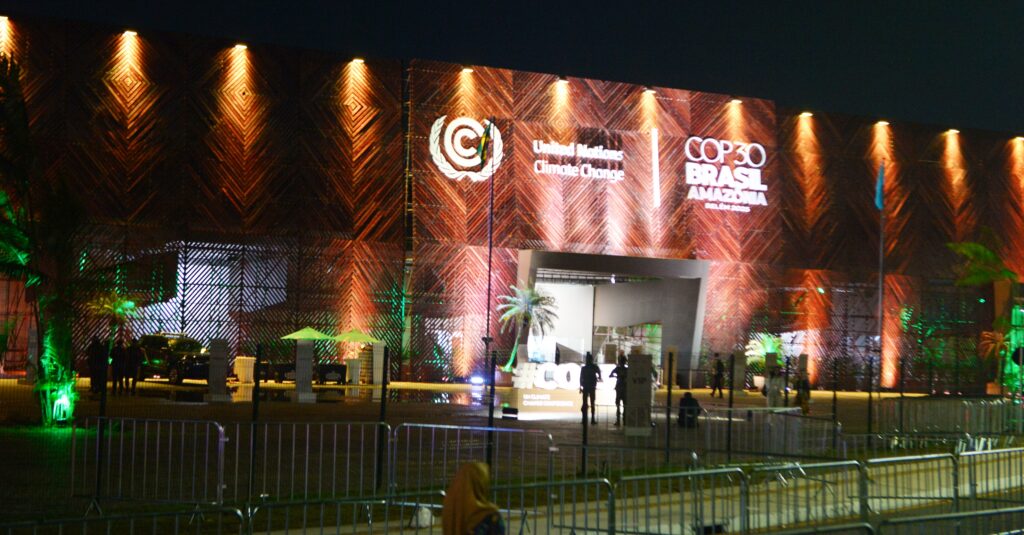26 November, 2025COP30 closed in Belém with a tone and atmosphere unlike recent years. Under the Brazilian Presidency, the summit was marked by more transparency, easier access to delegates and more open civic participation, including peaceful demonstrations inside the venue. For trade unions and civil society, this shift represented a meaningful change after several restrictive and difficult COPs.
A different political landscape
Brazil entered COP30 with ambition. Its priorities included stronger global commitments on emissions reduction, a significant increase in climate finance and clearer pathways to implementation. While not all proposals got full support, the overall process was more constructive than previous years and negotiators reported a willingness to avoid steps backwards.
Countries remained divided on several issues, especially climate finance. While language encouraging increased financial support was included in the final text, no binding targets were adopted. The gap between what is needed and what is currently committed remains large, particularly for adaptation and just transition measures.
Just Transition: a shift toward implementation
One of the most closely watched discussions at COP30 was the future of the Just Transition Work Programme (JTWP). Throughout the summit, Parties engaged in extensive dialogue on how to move from conceptual discussions to concrete implementation.
The proposal for a Belém Action Mechanism (BAM) generated intense debate over the past year. Many countries saw it as a way to accelerate implementation; others expressed concerns about financial implications, duplication of existing institutions and ensuring adequate space for workers and other non-state actors.
In the end, the outcome reflected a compromise. Rather than establishing a separate mechanism, Parties agreed to develop a "Just Transition mechanism” under Article 25 of the JTWP, with a first draft due by June 2026 at the UNFCCC meeting in Bonn. The Bonn Climate Change Conference is an annual United Nations Climate Conference that serves as the mid-year meeting of the Subsidiary Body for Implementation and the Subsidiary Body for Scientific and Technological Advice. The text emphasises international cooperation, capacity-building, technical assistance and knowledge-sharing and specifies that the mechanism must build on and complement existing work under the UNFCCC and Paris Agreement.
For labour, this outcome keeps the focus on practical and near-term steps while maintaining the relevance of established institutions, particularly the ILO and its Just Transition Guidelines, as essential reference points for operationalizing Just Transition.
Workers and rights gain visibility
Across negotiations, references to workers became more prominent. The final version of the JTWP highlights the importance of decent work, social dialogue and the inclusion of both formal and informal workers in transition processes. Although “trade unions” are not mentioned explicitly, workers’ issues had stronger visibility than in past COPs since they were mentioned in several Presidency speeches.
The Gender Action Plan, initially uncertain, was ultimately adopted, including language on women workers and gender-responsive Just Transition. This represents one of the clearest advances of COP30.
The closing statement delivered by the labour constituency also underscored the importance of anchoring Just Transition in rights, participation and decent work. As highlighted in the Trade Union and NGO (TUNGO) statement:
“For the first time ever, workers and their unions, women and gender groups, communities will get a dedicated place at the UNFCCC to work on our issues and rights. Trade unions have called for this for many years because protecting and promoting labour rights, organizing workers’ participation and genuine social dialogue to deliver decent work and quality jobs, pensions, health and safety, in concert with universal social protection systems are essential enablers for accelerating climate action.”
Technology, trade and institutional reform
The adoption of a new technological cooperation framework focused on supporting developing countries, advancing endogenous technologies and advancing inclusive and gender-responsive implementation. This framework will begin in 2025 and undergo a review in 2034.
Discussions on trade did not advance, as Parties reiterated that trade-related matters should remain within the WTO. Talks on institutional reform of the UNFCCC also did not progress, reflecting the challenge of reaching consensus on procedural questions.
Looking ahead: Bonn and COP31
The next important step will take place in June 2026, when the subsidiary bodies are mandated to present the first draft for operationalizing the new Just Transition mechanism.
The negotiations will then move toward COP31, co-presided by Turkey and Australia, where political conditions will shape how workers’ priorities are integrated into the agenda.
For IndustriALL, the direction remains consistent:
- keep workers at the centre of climate action;
- ensure Just Transition remains grounded in labour rights and social dialogue; and
- maintain the ILO as a key institution in shaping global implementation.
“COP30 did not resolve every challenge, but it opened new space for dialogue, strengthened the visibility of workers and set clearer expectations for the next stages of Just Transition. This gives us a foundation to keep advancing labour rights and decent work at the heart of climate action,”
says Kan Matsuzaki, IndustriALL assistant general secretary.
PHOTO: shutterstock Belem, Brazil- COP30- NOV 17, 2025- Marina Silva, COP president Correa do Lago, Activists and indigenous people handcrafts at the COP30 activities
